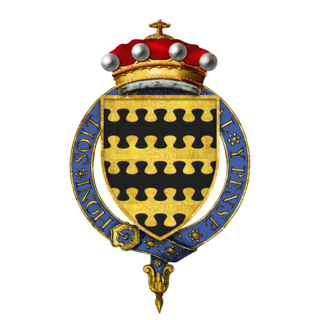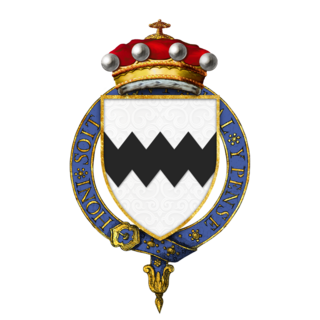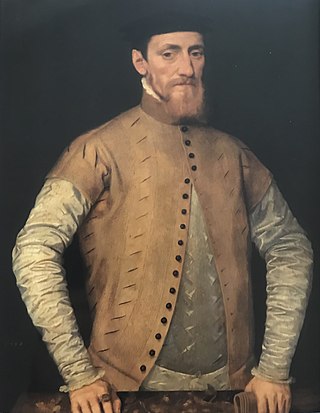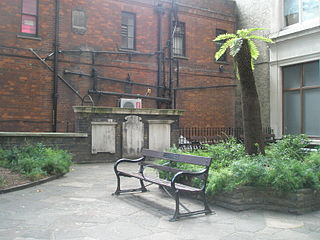
William Blount, 4th Baron Mountjoy, KG, of Barton Blount, Derbyshire, was an extremely influential English courtier, a respected humanistic scholar and patron of learning. He was one of the most influential and perhaps the wealthiest English noble courtier of his time. Mountjoy was known internationally as a humanist writer and scholar and patron of the arts.
Robert Fabyan was a London draper, Sheriff and Alderman, and author of Fabyan's Chronicle.

Thomas West, 8th Baron De La Warr and 5th Baron West, KB, KG was an English courtier and military commander during the reigns of Henry VII and Henry VIII.

Sir John Gresham was an English merchant, courtier and financier who worked for King Henry VIII of England, Cardinal Wolsey and Thomas Cromwell. He was Lord Mayor of London and founded Gresham's School. He was the brother of Sir Richard Gresham.
Richard Rich was a London mercer, and Sheriff of that city in 1441.

Sir John Mundy was a member of the Worshipful Company of Goldsmiths and was Lord Mayor of London in 1522.

St Peter, Westcheap, also called "St Peter Cheap", "St Peter at the Cross in Cheap", or "Ecclesia S. Petri de Wodestreet", was a parish and parish church of medieval origins in the City of London. The church stood at the south-west corner of Wood Street where it opens onto Cheapside, directly facing the old Cheapside Cross. In its heyday it was a familiar landmark where the City waits used to stand on the roof and play as the great processions went past. It was destroyed in the Great Fire of London in 1666, together with most of its surroundings, and was never rebuilt.

Sir Martin Bowes was a very prominent and active civic dignitary of Tudor London whose career continued through the reigns of Henry VIII, Edward VI, Mary I and Elizabeth I. Born into the citizenry of York, Bowes was apprenticed in London and made his career at the Royal Mint, as a master-worker and under-treasurer, and personally implemented the debasement of English currency which became a fiscal imperative in the later reign of Henry.
Sir Henry Keble was a grocer and Lord Mayor of London in 1510, in the second year of King Henry VIII's reign. Sir Henry was a leading grocer in London. He was a Merchant of the Staple in Calais. He was originally from Coventry, but had settled in the parish of St Mary Aldermary. He was six times Master of the Grocers' Company. He left bequests to the company, and gave £1,000 to rebuild the church at St Mary Aldermary.
William Ayloffe, was an English justice of the Queen's Bench.

Sir Anthony Cope of Hanwell, near Banbury, was an English knight, author, principal chamberlain to Queen Catherine Parr, and sheriff of Oxfordshire and Berkshire.

Sir Edmund Walsingham of Scadbury Hall, Chislehurst in Kent, was a soldier, Member of Parliament, and Lieutenant of the Tower of London during the reign of King Henry VIII.
Sir George Harper, JP was an English politician. He was Member of Parliament for Kent.
Sir Richard Baker, was an English politician.
Joan Leche, benefactress, was the wife successively of Thomas Bodley, and of Thomas Bradbury, Lord Mayor of London in 1509. She founded a chantry in London, and a grammar school in Saffron Walden, Essex. Her great-grandson, Sir John Leveson (1555–1615), was instrumental in putting down the Essex rebellion of 8 February 1601, and her great-grandson William Leveson acted as trustee for the original shareholders of the Globe Theatre.
Sir Michael Dormer was a wealthy member of the Mercers' Company, and Lord Mayor of London in 1541.
Anthony Stapleton was a Tudor lawyer, member of parliament, and Clerk of the City of London.
Sir John Shaa or Shaw was a London goldsmith. He served as engraver and later joint Master of the Mint, and as Sheriff and Lord Mayor of London. While Lord Mayor he entertained ambassadors from Scotland, and was among those who welcomed Catherine of Aragon to England. He is mentioned in a poem by William Dunbar.
Sir William Browne served as Master of the Worshipful Company of Mercers from 1507 to 1514, and as alderman, auditor, Sheriff and Lord Mayor of London. He died in office on 3 June 1514 while serving his term as Lord Mayor.
Sir William Lok was a gentleman usher to Henry VIII and a mercer, alderman, and sheriff of London. He was the great-great-great-grandfather of the philosopher John Locke (1632–1704).








